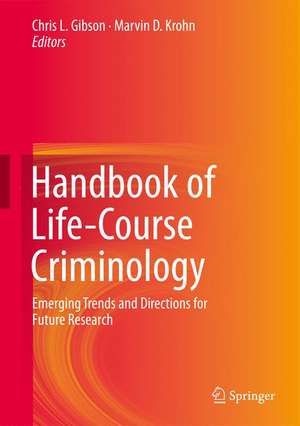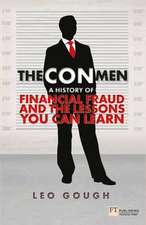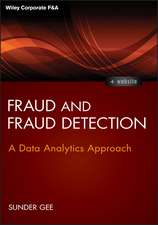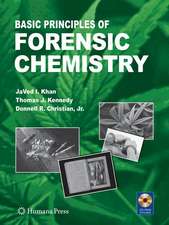Handbook of Life-Course Criminology: Emerging Trends and Directions for Future Research
Editat de Chris L. Gibson, Marvin D. Krohnen Limba Engleză Paperback – 29 iul 2014
Pathways to crime have been a central concept of criminology from its inception. Accordingly, a lifespan approach to the field has replaced earlier biological and sociological perspectives with a more nuanced understanding of offender behavior and a wider lens of study. The contributions to this Handbook break down issues of criminal and antisocial behavior from early childhood to late adulthood, examining developmentally targeted prevention and intervention strategies and reviewing emerging trends in research. Among the topics:
· Childhood: including physical aggression in childhood, pre- and peri-natal development, and environment.
· Adolescence: the impact of schooling, unstructured time with peers, gang membership and peer networks.
· Adulthood: Adult onset crime, unemployment in emerging adulthood, crime and adult outcomes.
· Prevention and Intervention: community programs, lifetime intervention strategies, re-entry.
This volume will be a valuable piece for researchers in Criminology and Criminal Justice as well as related disciplines such as Sociology, Developmental Psychology, and Social Policy. It will serve as an important reference for the current state of research, as well as a roadmap for future scholars.
"This impressive Handbook provides comprehensive coverage of key developmental and life course issues in criminology from birth to adulthood, including biology, genetics, gangs, schools, neighborhoods, adult onset, desistance, and interventions. The research recommendations in each chapter are especially important, and they should stimulate advances in knowledge for many years to come. This Handbook should be required reading for all criminologists."
David P. Farrington, Professor of Psychological Criminology, Cambridge University, Cambridge, UK
“In just a few decades developmental criminology has become the dominant intellectual force in criminology. This volume demonstrates why. It provides incisive reviews of important themes in developmental criminology. More importantly, it lays out rich agendas for future research that should inspire the next generation of developmental criminologists.”
Daniel S. Nagin, Teresa and H. John Heinz III University Professor of Public Policy and Statistics, Carnegie Melon University, Pittsburgh, PA, USA
| Toate formatele și edițiile | Preț | Express |
|---|---|---|
| Paperback (1) | 951.47 lei 6-8 săpt. | |
| Springer – 29 iul 2014 | 951.47 lei 6-8 săpt. | |
| Hardback (1) | 958.88 lei 6-8 săpt. | |
| Springer – 5 noi 2012 | 958.88 lei 6-8 săpt. |
Preț: 951.47 lei
Preț vechi: 1160.32 lei
-18% Nou
Puncte Express: 1427
Preț estimativ în valută:
182.09€ • 189.40$ • 150.32£
182.09€ • 189.40$ • 150.32£
Carte tipărită la comandă
Livrare economică 14-28 aprilie
Preluare comenzi: 021 569.72.76
Specificații
ISBN-13: 9781493917914
ISBN-10: 1493917919
Pagini: 354
Ilustrații: XIII, 341 p. 19 illus.
Dimensiuni: 178 x 254 x 23 mm
Greutate: 0.62 kg
Ediția:2013
Editura: Springer
Colecția Springer
Locul publicării:New York, NY, United States
ISBN-10: 1493917919
Pagini: 354
Ilustrații: XIII, 341 p. 19 illus.
Dimensiuni: 178 x 254 x 23 mm
Greutate: 0.62 kg
Ediția:2013
Editura: Springer
Colecția Springer
Locul publicării:New York, NY, United States
Public țintă
ResearchCuprins
Foreword.- Physical Aggression in Childhood.- Biology and Crime.- Molecular Genetics and the Environment.- Genetic Plasticity.- Neighborhood Effects on the Development of Childhood Aggression and Interpersonal Violence.- The Impact of Schooling Across the Life-Course.- Unstructured Time Spent with Peers and Its Impact on Persistent Criminal Involvement.- Adolescent-Limited Offenders.- The Long Term Impact of Adolescent Gang Membership.- Peer Networks.- Adult Onset and the Late Bloomer Phenomenon.- Employment and Crime in the Emerging Adulthood Years.- Quantitative Research on Desistance.- Qualitative Research on Disistance.- Propensity for Crime and Adult Outcomes.- Communities that Care Programs.- The State of Prevention and Intervention Strategies Over the Lifecourse.- Re-entry over the Life Course.
Recenzii
From the reviews:
“Gibson and Krohn have edited a very excellent and comprehensive volume bringing together original and relevant summaries on ‘life-course development criminology.’ … Gibson and Krohn’s work provides a very admirable summary of life-course criminology articles that identify social factors for understanding criminal conduct. Summing Up: Highly recommended. Upper-division undergraduates and above.” (G. C. Leavitt, Choice, Vol. 50 (11), July, 2013)
“Gibson and Krohn have edited a very excellent and comprehensive volume bringing together original and relevant summaries on ‘life-course development criminology.’ … Gibson and Krohn’s work provides a very admirable summary of life-course criminology articles that identify social factors for understanding criminal conduct. Summing Up: Highly recommended. Upper-division undergraduates and above.” (G. C. Leavitt, Choice, Vol. 50 (11), July, 2013)
Notă biografică
Chris L. Gibson is a W.E.B. Du Bois Fellow of the National Institute of Justice and teaches in the School of Sociology and Criminology & Law at University of Florida. His research interests include Life Course and Biosocial Criminology, Neighborhood and Contextual Development, and Quantitative Methods.
Marvin Krohn is Department of Sociology and Criminology & Law at University of Florida. His research interests in juvenile delinquency focus on theoretical explanations of delinquent and deviant behavior. He is the recipient of a grant from the Office of Juvenile Justice and Delinquency Prevention for "A Panel Study of Reciprocal Causal Model of Delinquency" and one from the National Institute of Drug Abuse for a study entitled "A Social Network Approach to Drug Use of Minority Youth." He is co-editor of the 5th edition of Delinquent Behavior (Prentice Hall, 1991), and the Handbook on Crime and Deviance (Springer, 2009). Recently Krohn received both the University Award and the Chancellor's Award for Excellence in Teaching.
Marvin Krohn is Department of Sociology and Criminology & Law at University of Florida. His research interests in juvenile delinquency focus on theoretical explanations of delinquent and deviant behavior. He is the recipient of a grant from the Office of Juvenile Justice and Delinquency Prevention for "A Panel Study of Reciprocal Causal Model of Delinquency" and one from the National Institute of Drug Abuse for a study entitled "A Social Network Approach to Drug Use of Minority Youth." He is co-editor of the 5th edition of Delinquent Behavior (Prentice Hall, 1991), and the Handbook on Crime and Deviance (Springer, 2009). Recently Krohn received both the University Award and the Chancellor's Award for Excellence in Teaching.
Textul de pe ultima copertă
The Handbook of Life-Course Criminology covers genetics and environment, child offenders and late bloomers, the impact of school and peers, lifelong and time-limited criminal careers, and qualitative and quantitative methodologies. This unique Handbook is further set apart by its dual coverage of the leading edge of current research and innovative directions for future work in the field.
Pathways to crime have been a central concept of criminology from its inception. Accordingly, a lifespan approach to the field has replaced earlier biological and sociological perspectives with a more nuanced understanding of offender behavior and a wider lens of study. The contributions to this Handbook break down issues of criminal and antisocial behavior from early childhood to late adulthood, examining developmentally targeted prevention and intervention strategies and reviewing emerging trends in research. Among the topics:
-Childhood: physical aggression in childhood, pre- and peri-natal development, and environment.
-Adolescence: the impact of schooling, unstructured time with peers, gang membership and peer networks.
-Adulthood: Adult onset crime, unemployment in emerging adulthood, crime and adult outcomes.
-Prevention and Intervention: community programs, lifetime intervention strategies, re-entry.
"This Handbook should be required reading for all criminologists."
David P. Farrington, Professor of Psychological Criminology, Cambridge University, Cambridge, UK
“...it lays out rich agendas for future research that should inspire the next generation of developmental criminologists.”
Daniel S. Nagin, Teresa and H. John Heinz III University Professor of Public Policy and Statistics, Carnegie Melon University, Pittsburgh, PA, USA
Pathways to crime have been a central concept of criminology from its inception. Accordingly, a lifespan approach to the field has replaced earlier biological and sociological perspectives with a more nuanced understanding of offender behavior and a wider lens of study. The contributions to this Handbook break down issues of criminal and antisocial behavior from early childhood to late adulthood, examining developmentally targeted prevention and intervention strategies and reviewing emerging trends in research. Among the topics:
-Childhood: physical aggression in childhood, pre- and peri-natal development, and environment.
-Adolescence: the impact of schooling, unstructured time with peers, gang membership and peer networks.
-Adulthood: Adult onset crime, unemployment in emerging adulthood, crime and adult outcomes.
-Prevention and Intervention: community programs, lifetime intervention strategies, re-entry.
"This Handbook should be required reading for all criminologists."
David P. Farrington, Professor of Psychological Criminology, Cambridge University, Cambridge, UK
“...it lays out rich agendas for future research that should inspire the next generation of developmental criminologists.”
Daniel S. Nagin, Teresa and H. John Heinz III University Professor of Public Policy and Statistics, Carnegie Melon University, Pittsburgh, PA, USA
Caracteristici
Comprehensive coverage of Criminology research at each stage of Life-Course development
Covers impact of genetics, environment, life events in cases and specific research methodologies
Presents current state of research with areas for future development
Foreword by Terrie E. Moffitt, Knut Schmidt Nielsen Professor, Department of Psychology and Neuroscience, Duke University, Durham, NC, USA
Covers impact of genetics, environment, life events in cases and specific research methodologies
Presents current state of research with areas for future development
Foreword by Terrie E. Moffitt, Knut Schmidt Nielsen Professor, Department of Psychology and Neuroscience, Duke University, Durham, NC, USA










